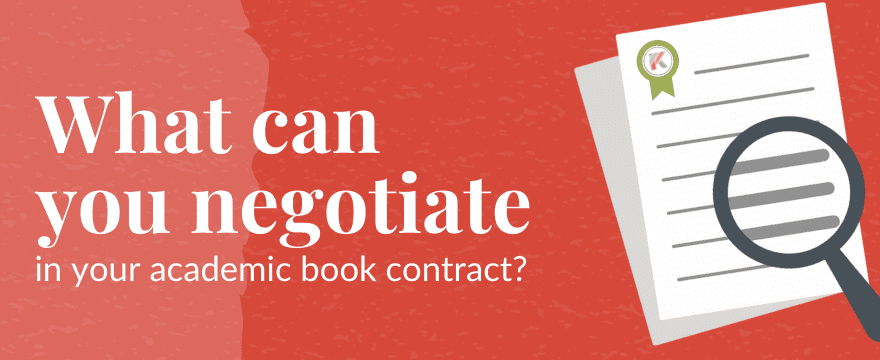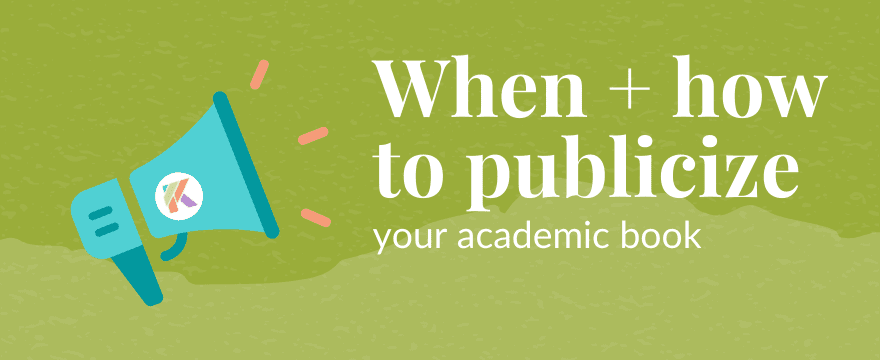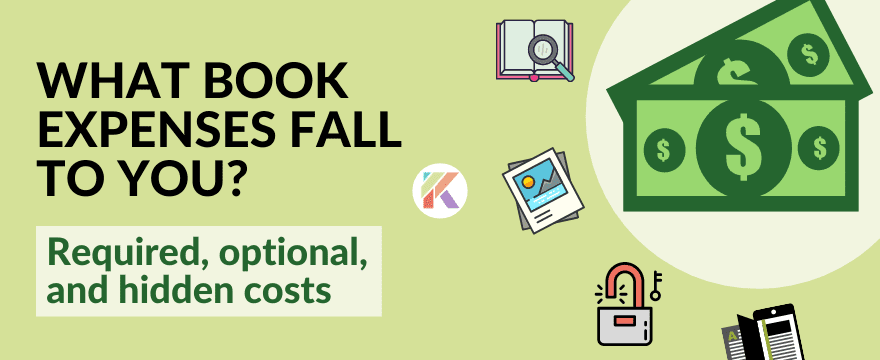When you’re writing your first academic book, your main focus is ensuring its content is compelling. So, negotiating an academic book contract is probably only barely on your radar. Especially if you’re on the tenure track, receiving a book contract is already a major victory, and you might hesitate to negotiate for fear of alienating your editor or publisher.
In this post, I outline which dimensions are open to negotiation (and which are usually not) and offer some tips for approaching these negotiations.
Elements You Can Begin Negotiating Before Receiving an Academic Book Contract
If you’re publishing your first academic book, you likely don’t realize that you can (and sometimes should) discuss a few things with your publisher before receiving a formal contract.
Whether you’re merely curious about these possibilities or you require one or more (usually open access), because they potentially involve expenses the press would hope to defray, these are dimensions you should consider discussing in advance of the full book contract.
Open Access (might require a subvention)
If your book must be open access–for instance, if you are a UK scholar and want your book to eligible for the REF–you should discuss this requirement with your acquiring editor before the contract stage. If you’re curious about open access, bring it up with your editor early. Your press might require a subvention for this (and for other unique book parameters).
Straight to Paperback (might require a subvention)
Some presses release books in hardback first and will only publish the book in paperback if they sell a certain number of copies. In this model, because most academic books sell only a few hundred copies, your book might never go to paperback. Consequently, it can remain financially inaccessible to individual scholars.
If your press publishes in this way and you are at a research-focused institution, consider asking your colleagues or chair about what (if any) institutional funds exist to support a book going straight to paperback. You can also find out from your editor what amount of financial support the press would need. Find out more in my post on expenses associated with publishing your book.
Elements of an Academic Book Contract You Can Negotiate
The Book Details: Manuscript Delivery Date, Images, Word Count, Percent of Pre-Published Material, etc.
The full book contract represents the agreement between the author and publisher about what, exactly, will be delivered and when. So, the full academic book contract negotiation stage is your final opportunity to specify how many words your book will contain and when you will deliver it (among other factors).
If you later find yourself unable to meet your delivery date, you can certainly ask for an extension, but you should ask for a delivery date you are reasonably sure you can meet. When determining the manuscript delivery date, consult trusted mentors regarding what time frame would be reasonable given your teaching load and the extent of the revisions you must complete.
If you hope for the book to contain images (also sometimes called “illustrations”), do ensure that the number of images specified in the contract and the type of images (color, black and white) match your expectations. If you’re unsure, ask your editor for clarification. (Defraying the cost of publishing a lot of images or color images is an expense you must usually incur. You’re also responsible for copyright fees and image permissions.)
Finally, at this point, the word count should not be a wild guess (as it might have been at the proposal stage). If your manuscript departs radically from the number specified in your contract, you will likely have to get permission from your editor before you submit that manuscript.
Negotiating the book details–especially if something is unclear–is commonplace and expected.
Number of Author Copies
Your contract should specify how many copies you will receive of your book. Mine was in the single digits. If you want additional copies, you will need to buy them yourself (usually at a discounted rate). Before negotiating, think about whom you would like to give a copy of your book. If you conducted ethnographic research: did you promise (or hope?) to send copies to the study participants?
Negotiating the number of author copies is a comparatively small ask. When negotiating this point in writing, do be sure to tactfully justify why you are requesting additional author copies, especially if you are asking for significantly more copies.
“Right of First Refusal”
Unlike the other dimensions of an academic book contract, this language is something you likely don’t know to look for. Some presses automatically include “right of first refusal” language in all of their academic book contracts, while others do not.
The “right of first refusal” clause effectively gives that press the exclusive first shot at your next book. So, you would have to send your proposal (or, at the very least the idea for your next book) to that publisher, exclusively, first. Only if they pass on the project (the “first refusal”) would you be free to approach other publishers with the project. This clause does not require the press to publish or even review the next book, but it does lock you (the author) into proposing the next project to them, exclusively, first.
If being locked into at least proposing your next book to that press exclusively first is fine with you, then there’s no need to negotiate it. If, by contrast, you would prefer to be able to approach other presses (whether in conjunction with this press or not) with your next project, you can ask that this clause be removed.
Negotiating the right of first refusal in your book contract is fairly straightforward. You can ask for it to be removed from the contract. The editor, of course, can decline to remove it.
Royalties
Royalty rate is probably the first thing that comes to mind when you think about negotiating an academic book contract, but I list it last for a reason. You can certainly try to negotiate your royalty rate (usually in the single or low double digits for humanities monographs), but presses usually don’t have much leeway here.
The contract might specify different royalty rate tiers based on number of copies sold. It should specify the rates for hardback and paperback versions.
Because royalties are usually fairly standardized, negotiating them is more significant than other things you might ask for. To successfully negotiate royalties, you will need a convincing (likely quantitative) argument making a strong case that your book can reasonably be expected to sell more copies than most first books in your field.
(Want more ideas? Check out Chapter 13 of Laura Portwood-Stacer’s The Book Proposal Book!)
Mostly Non-Negotiable Elements of an Academic Book Contract
Finally, there are certain dimensions of academic book contracts that are typically non-negotiable.
Who Produces the Index
At most university presses, the author is responsible for producing the index (or paying to have one produced). Some presses contract with or recommend indexers. If you are interested in having an index produced for your book, inquire at your institution about whether you can apply for funding for such an expense. Or, learn more about what preparing an index entails.
Who Pays for Image Permissions and Copyright
This expense also typically falls to the author. To defray the costs, you can seek funding from your institution, if available. Learn more about what you need to know if you want to include copyrighted material or images in your book.



